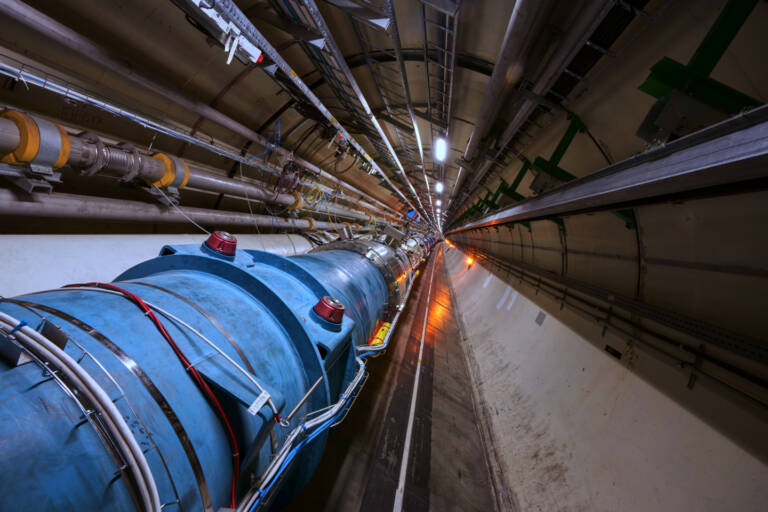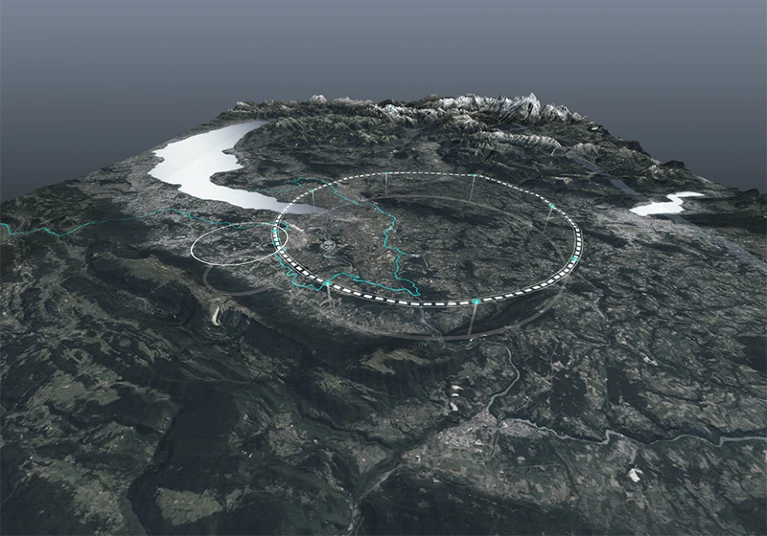CERN wants 16 billion euros for the new “Boson Factory”, the super accelerator

In Europe, as noted by Nature , they are trying to justify a huge particle accelerator project costing 14 billion Swiss francs (16 billion euros, 17 billion dollars), under the French and Swiss countryside. The machine would allow researchers to study the Higgs boson in detail. This machine would surpass the Large Hadron Collider (LHC) many times over, but given that this has failed to open the doors to a "New Physics", it will not be easy to convince financiers to subsidize this new venture.
Details of CERN's plan emerged from a mid-term report studying the feasibility of the Future Circular Collider (FCC), which would serve as a counterpart to its predecessor, the 27-kilometer LHC at CERN, the European particle physics laboratory near Geneva, Switzerland.
How the revamped Large Hadron Collider will hunt for new physics
The first phase of the study, which focused on identifying where and how such a machine could be built in the CERN region, revealed "no technical or scientific obstacles" preventing its construction, Eliezer said Rabinovici, president of the CERN Council, the organization's governing body, during a press briefing on February 5.
The construction of the machine, which will require the excavation of a circular tunnel about 200 meters deep, could begin as early as 2033. The 91 kilometer long tunnel, which according to the project should be interrupted by four experimental rooms and would have a diameter of almost 15 km. The Council reviewed the report on February 2, but the document itself has not been made public. The full study will be published next year and a decision on the project is expected to be made before 2028.
Former CERN director general Chris Llewellyn Smith said he was perplexed by the decision not to publish the interim report, but believes CERN is on the right track, “without a doubt,” but this is not surprising.
Particles colliding
The planned machine is expected to collide electrons with their antimatter partners, positrons, starting around 2045, with the aim of generating and studying in detail around one million Higgs bosons. Many physicists believe that studying the particle, which was discovered in 2012 and interacts like no other, represents physics' greatest chance of finding cracks in the Standard Model, a successful but incomplete model of particles and forces. From here we could start for the redefinition of a new physics, or at least we hope that the "Boson Factory" goes in this direction.
Physicists have called for a study into the feasibility of FCC in 2020 as part of a prioritization exercise known as the European Strategy for Particle Physics. Fabiola Gianotti, director general of CERN, told reporters that the strategy found the FCC to be “the most convincing scientific instrument” among those considered.
The construction of the FCC is far from a given. Much of the 15 billion Swiss franc price tag will be covered by CERN's current budget, Gianotti added. But the project will still require financial contributions from European countries that are full members of CERN and other countries such as the United States and Japan. The briefing did not provide any information on what these costs might be. “It seemed like they were avoiding giving specific numbers, like costs and non-member states' share of participation,” says Michael Riordan, a physics historian based in Eastsound, Washington.
The other “Boson Factories”
Meanwhile, other “Higgs factory” projects are in the pipeline around the world. The Japanese government has shown interest in hosting the long-planned International Linear Collider, while China is planning a ring machine called the Circular Electron Positron Collider. Gianotti said the European Strategy for Particle Physics found that the FCC has greater physical potential than a linear collider, because it could produce Higgs bosons at a higher rate and because the same tunnels could be used later for a much higher energy machine that collides protons.
Not everyone in the particle physics community is in favor of CERN's proposed machine. Donatella Lucchesi, a particle physicist at the University of Padua in Italy, disagrees with the organization's focus on the FCC. “I don't think this is good for our community, for scientific reasons and otherwise.” Lucchesi is part of a team studying an alternative technology for future colliders, based on colliding beams of muons instead of electrons or protons.
Particle physicists want to build the world's first muon collider
Gianotti said the FCC's construction would not prevent CERN from contributing to a muon collider, a facility U.S. scientists would like to fully experiment with. Muons are much more massive than electrons and allow for high-energy collisions. But no one yet knows whether it is possible to build a muon collider. “Of course we will work with our US colleagues if they want to build a new collider in the US, but the times are totally different from those of the FCC,” the expert said.
Some scientists argue that the cost of building these mega colliders outweighs their benefits, especially when theory gives no clear indication of what might be discovered. “It's true that at the moment we don't have clear theoretical guidance on what we should be looking for,” Gianotti said, but she added that this is an argument in favor of building a new machine. “The tools will allow us to take a big step forward in addressing the issue, while also telling us what the right questions are,” he said .
For comparison, the already very expensive ITER, the European nuclear fusion experiment, costs 20 billion euros, but should pave the way for commercial fusion. The experimental spherical tokamak that should generate Tokamak energy fusion costs around 65 million euros . Should we spend 16 billion euros on a machine that, at risk, might not discover anything at all, and in any case would make discoveries useful only to theoretical physics?

Thanks to our Telegram channel you can stay updated on the publication of new Economic Scenarios articles.
The article CERN wants 16 billion euros for the new "Boson Factory", the super accelerator comes from Economic Scenarios .
This is a machine translation of a post published on Scenari Economici at the URL https://scenarieconomici.it/il-cern-vuole-16-miliardi-di-euro-per-la-nuova-fabbrica-di-bosoni-il-super-acceleratore/ on Fri, 09 Feb 2024 12:20:05 +0000.

